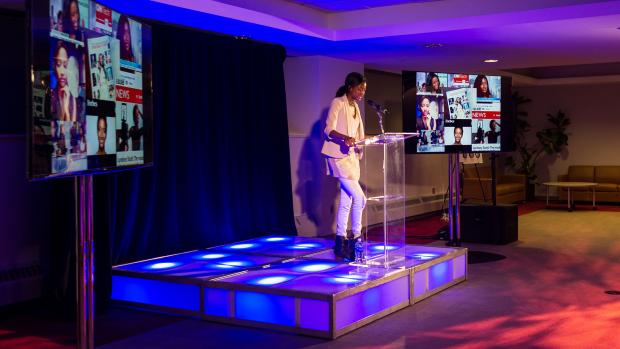Empowering the Next Generation: History Becomes HERStory
Women in Engineering Summit Highlights Women’s Successes—and Challenges—in the Tech Field

The Regna Lounge had been transformed into a lively networking space. A photo area was set up for guests to take group shots with light-up wands. A large whiteboard stood, inviting anyone to write a response to the question, “What empowers you?” And people of all age groups, from adult professionals to Girl Scouts, mingled over cookies and punch.
This was the fourth annual Women in Engineering Summit: Invent/Empower. Held over three days, the summit highlighted the accomplishments of women engineers, entrepreneurs, and professionals who have made big impacts in their fields. Instead of merely mentioning the positive aspects of their careers, however, the talks often got into the hiccups and bumps that occurred along the way. Lyndsey Scott, the summit’s opening keynote speaker, especially made this bumpy road toward success poignant.
Scott, a developer who created such iOS apps as iPort, Cool Made Cool, and Squarify, among others, also works as a model and actress. As a college student at Amherst, she dual-majored in theater and computer science, and, while she had a gift for programming, felt more of an affinity to modeling and acting. Scott’s persistence paid off and she was the first African American model to land the Calvin Klein exclusive during fashion week. Other big fashion labels and campaigns followed.
At one point, however, the modeling jobs began to wane, and Scott instead turned to programming and coding while retaining her modeling career part-time. Many opinions came Scott’s way about how she was handling her own career—that she should devote her time entirely to tech and to ditch the modeling altogether. “In a way, I feel sorry for anyone who automatically assumes that I’m not a real programmer just because I’m not a stereotypical programmer,” Scott mused.
As an active member of stackoverflow, a question/answer community of programmers, Scott came across firsthand examples of sexism in tech: “I learned the hard way that if you’re in a boy’s club and you make a mistake, the attacks are directed on your femininity.” She had posted an answer with a mistake in it, and other male members coupled her incorrect answer with her femaleness. Scott eventually clawed her way to the top of the site, becoming the highest rated user. She maintains, however, that the point is not for women and minorities to be pushed to be the best—the point is that they should be allowed to not be the absolute best while still being taken seriously.
Another event held at the symposium—Lightning Talks—comprised ten-minute lectures in quick succession by three women creators. These gave the guests a taste of the varied work of each lecturer. In one talk, Anne-Laure Fayard, professor in the Department of Technology Management and Innovation at the School of Engineering, discussed her work reinventing and digitizing antiquated air traffic control systems, as well as her tech-humanitarian work with SMSanté, an SMS system in African countries used to track the spread of Ebola, and the Bindi Project, a program that offers entrepreneurial women living in slums the means to build an infrastructure and community.
Nicole Hamilton, the CEO and founder of Tactile Finance, a mortgage service that prides itself in its transparency, discussed the personal reasons why she began this business. Hamilton was, several years ago, in the process of purchasing a home herself through a mortgage—then the Great Recession happened. She felt that mortgage lenders were too opaque, forcing homeowners to sign contracts they didn’t entirely know the ins and outs of, ultimately leading to a great deal of the foreclosed homes. “I was mad,” Hamilton admitted. Tactile Finance at its core is very technical, but offers a simple interface to give its users total control over their finances. “The ability to empower is something I can hang my life on.”
The third Lightning Talk speaker, Dana Karwas, is a lecturer in the Department of Technology, Culture, and Society at the School of Engineering. She is also co-director of The Satellite —a project that combines art, tech, and science. Instead of merely rendering images of Earth, The Satellite is intended to be a hyperrealistic visualization of the planet that updates in real time as an art installation. The project uses live data from the hundreds of satellites circumnavigating Earth, requires the building of a particle system and a way to generate real-time 3D clouds, and will have a specially-built viewing chamber made that is able to output images at an ultrahigh resolution. The results will, no doubt, be stunning. The possibility of seeing volcanoes erupting as they happen, for example, will be possible with this technology. “You’ll be able to see storm patterns way better than on any weather map,” Karwas proclaimed. The closing keynote address was delivered by alum, Ruthie Lyle-Cannon, master inventor and first African American Ph.D. to graduate from the Polytechnic, and who has over 100 patents to her name.
Throughout the summit, the spirit of camaraderie and collaboration was evident. All were encouraged to ask questions and join in. Although women were the focus of the summit, men were active participants in the discussions. During Scott’s talk, she was asked, to much applause, “As a man, how can we be better allies to women in tech?” Her response was to “treat a woman the same way you would a man. Never assume you know more than anyone.”
Anita Farrington, Associate Dean of Student Affairs at the School of Engineering, succinctly stated the reasons why this summit is important: Only 14% of the engineering workforce is women, and the organizers of the summit are committed to increasing those numbers and turning more female students to STEM. Women are a large consumer of tech and it’s imperative that they be represented: “We believe that exposing our young ladies to these opportunities is critical.”




